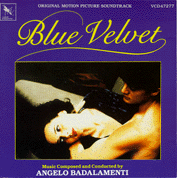
Lynch's Faithful Score Composer Since 1986
 | Blue Velvet marked the first collaboration of David Lynch and Angelo Badalamenti. According to comments made by the director, Badalamenti was suggested to him by producer Fred Caruso. Lynch was skeptical about the meeting, but the moment he and Badalamenti began working with one another it was clear that the link between their music was going to be as strong as that between Elfman and Burton, Hermann and Hitchcock. |
When Lynch made his sojourn to television, Badalamenti accompanied him. They had already written the song "Falling" which is the final track of the soundtrack, and which, without lyrics, stands as the theme to the series. Along with their new collaborator, vocalist Julee Cruise, Badalamenti and Lynch helped to compose a score that would lend a specific tone to this odd corner of small-town America. The music, a melding of Lynch's mysterious lyrics and Badalamenti's haunting lyrics, were also great aids in the plot of the film, and the creation of the world of the Black Lodge. |  |
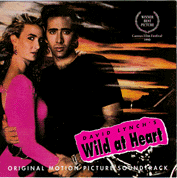 | Wild At Heart, the Barry Gifford adaptation which prompted Lynch's departure from Twin Peaks (and perhaps the failure of the series, also prompted another score with Badalamenti. A far more sinister and heavy score, than those in the past, this CD also showed the works of other artists, including Chris Isaak. Isaak's Wicked Game became considered one of the more sensual videos on MTV--the video was also directed by Lynch, and demonstrated black and white work similar to the work he did for Calvin Klein and Giorgio Armani. |
When Lynch and Badalamenti returned to the world of Twin Peaks in 1992, the two maintained a more sinister outlook. With the exception of the final pieces of the score, where he angel descends to rescue Laura from the Black Lodge, Fire Walk With Me is as sinister (musically) as Wild At Heart. This CD also sports tracks sung by Angelo Badalamenti to accompany Bobby Briggs as he tramps around Twin Peaks High School. Soon, an MP3 of the Twin Peaks score montage will be available here so you, the faithful viewer (listener), can decide if either of the discs is worth your while. | 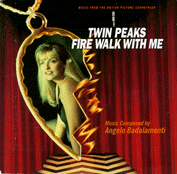 |
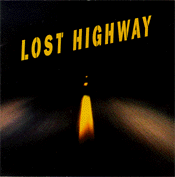 | 1997's Lost Highway saw Lynch and Badalementi return to more lighter fare, and also introduced artists who seem as if they will be constant parts of the Lynch entourage: David Bowie (whom Equinox loves) and Trent Reznor. Bowie's "Deranged" became the aural backdrop for the entire film. Also, the presence of Antonio Carlos Jobim's work on the soundtrack seems an open salute to one of Badalementi's greatest influences. |
 | The City of Lost Children, a marvelous film by Jeunet and Caro, is as dependent on its score as any Lynch film. With City of Lost Children, Badalamenti proves that the moment his music is on the soundtrack of a film, he evens the playing field between aural and visual experience, raising the level of sound right to that of the images--something that may seem a tad redundant but is rare. |
On Booth and the Bad Angel, Badalamenti and James Booth, the lead singer of the band JAMES, collaborate on a wonderful rock album. For the most part, the music is played by Angelo with Booth covering the vocals, but the few songs where they are singing duets...where there is a call and response going on... those tracks are just a hoot! | 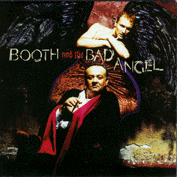 |
 | Red Hot Rhapsody is a salute to the great songs of George and Ira Gershwin. A part of a new set of Gershwin albums which have been popping up, Red Hot Rhapsody's final track is A Foggy Day with instrumentation by Angelo Badalamenti and vocals by David Bowie. |